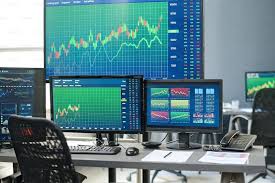The Forex market, also known as the foreign exchange market, is one of the largest and most dynamic financial markets in the world. Trillions of dollars are exchanged daily, making it an attractive space for traders of all levels. Central to this trading experience are Forex brokers, who act as intermediaries, facilitating your access to this enormous market. However, not all brokers are the same. Understanding the different types of forex trade brokers is key to making informed decisions as a trader.
Here’s a breakdown of the main categories and what makes them unique.
Dealing Desk (Market Makers)
Dealing desk brokers, often referred to as “market makers,” create their own liquidity by setting bid and ask prices for currency pairs. Unlike other types of brokers, dealing desks essentially act as a counterparty to their clients’ trades. When a trader places an order, the broker fulfills it internally rather than passing it onto the broader market.
This model is generally favored for its simplicity and reliability in terms of execution. Market makers often provide fixed spreads, meaning traders will know in advance the cost of opening or closing a position. These brokers are typically better suited for beginners and casual traders who prefer having predictable trading conditions without relying on market volatility.
No Dealing Desk (NDD) Brokers
NDD brokers take a different approach by routing clients’ trades directly to liquidity providers, such as banks, financial institutions, or other brokers. As the name suggests, there is no dealing desk involved in the process. These brokers usually operate as either Straight Through Processing (STP) brokers or Electronic Communication Network (ECN) brokers.
• Straight Through Processing (STP): STP brokers streamline the trading process by sending orders directly to liquidity providers. This model is celebrated for its speed and efficiency, as trades are executed with minimal delay. Spreads with STP brokers are typically variable, depending on market conditions, but the trading experience remains relatively straightforward.
•
• Electronic Communication Network (ECN): ECN brokers take things a step further by offering a trading environment that connects multiple market participants. This creates a transparent, real-time system where traders can access the best available prices. ECN brokers are often preferred by experienced traders and institutional participants who prioritize tight spreads and high-speed execution.
•
Both types of NDD brokers are known for being more market-driven and can adapt well to highly liquid markets, making them an appealing choice for traders seeking deeper insights into real-time pricing.
Hybrid Brokers
Some brokers combine characteristics of both dealing desk and no dealing desk models to deliver a hybrid setup. These brokers typically offer a mix of fixed and variable spreads to adapt to the needs of diverse trader types. For example, they may act as market makers for smaller trades while routing larger orders to external liquidity providers.
Hybrid brokers are ideal for traders looking for flexibility, as they allow market participants to choose between fixed-rate conditions or variable-rate strategies depending on their preferences and goals.
Specialist Brokers
A small subset of Forex trade brokers specializes in catering to a particular segment of the market or offering unique trading features. These brokers might focus on specific asset classes, advanced trading platforms, or bespoke market insights tailored to advanced individuals or firms. They’re generally more personalized and cater to highly strategic needs, but may have narrower offerings compared to more general brokers.
Finding the Right Broker for You
The broker you choose will directly impact your trading experience, from execution to the tools you have at your disposal. By understanding the distinctions between these types of brokers, you will be better equipped to align your trading strategy with the right partner.
Whether you’re just starting or an experienced trader looking to optimize your approach, defining your priorities is crucial. Do you prefer fixed spreads or variable ones? Are you looking for high-speed execution and access to deep liquidity? Taking time to evaluate these considerations will go a long way in ensuring your Forex trading success.

